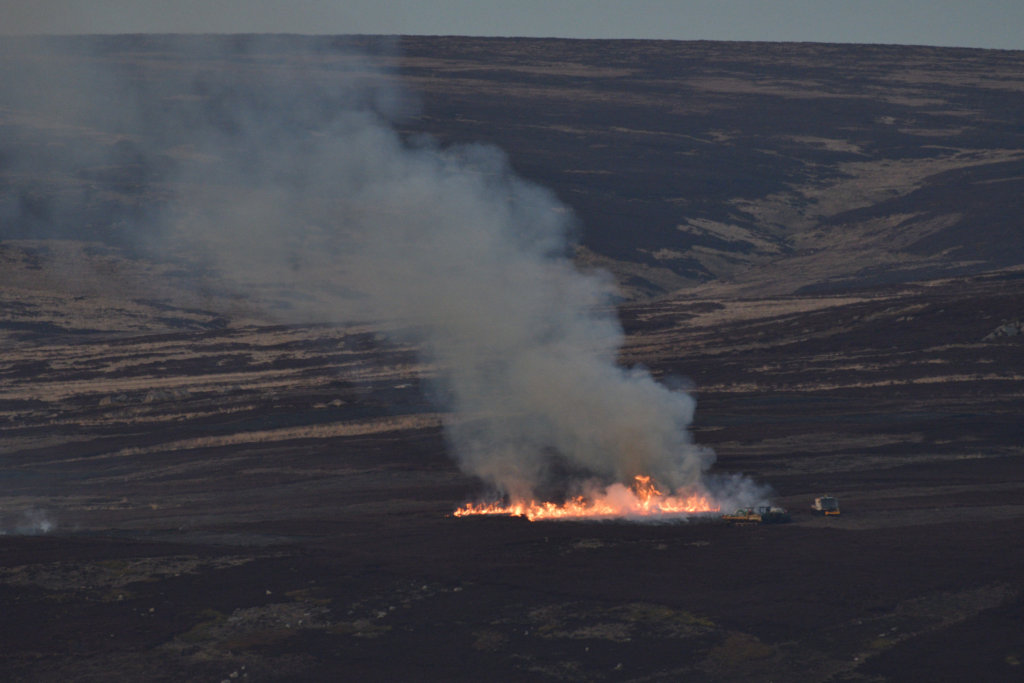
I was copied into this email recently. I’ve disguised the names and location as the complaint is a general one which I have seen many times before – but here it is very well-expressed.
[registration_form]However, I might point out that I have lived on the ********* for 30 years and I know the regulations. I have tolerated moor burn over all that time but this year, and the last, I have been both inconvenienced and my health affected by an increase in burning in the area of my property. Fires have been lit with little or no consideration of the prevailing wind and the impact on local community health.
Last year I complained to the agents for the ******* & ******** Estates, asking for a little more consideration, having been subjected to moor burning in the proximity of my home for 14 of 16 days in succession (Thank God for Sundays). The reply was also unsatisfactory.
Moor burning, at a time when DEFRA is promoting a voluntary moratorium, is not illegal, of course. However, subjecting local domestic dwellings and the local population to toxic levels of smoke and poor air quality for days in succession, must be covered by some legislation … and the local council environmental health officers would surely be responsible for the investigation of such matters, not the National Park.
> toxic levels of smoke and poor air quality for days in succession
That seems like fertile grounds for a law-suit for damages. Especially since the effects of “smoking” are well known.
Seems the concern that the landowners have for the countryside does not extend to the people living in it.
I suspect it would be difficult to win damages on those grounds. However, there might be a case for this kind of thing falling under ‘statutory nuisance’. In essence a statutory nuisance is something that affects a persons reasonable enjoyment and use of their property and typically it relates to things such as noise, smoke, dust, odours etc emanating from one property towards other properties. The local authority has the power to deem such issues as statutory, nuisance and issue an abatement order which the person on whom the order is served is legally obliged to carry out and failure to do so can result in prosecution. The first step is to complain to the local authority who are obliged to investigate if a matter could be a statutory nuisance (so it is probably a good idea to suggest that it is when making the complaint).
If complaining to a Local Authority it is best to keep a diary of each event, date, time and nuisance caused and submit it writing.
Yes, excellent advice, Richard.
Exactly. If they genuinely believed that grouse moors were the best option for rural economies and jobs then they themselves would be pushing the government to conduct a comprehensive and independent study of their economics to convince the public of that and undermine the position of their opponents. They never have and when given an opportunity to support a petition initiated outside their community they refused to do so or even acknowledge it existed.
What conclusions are we to draw from that, they don’t actually believe their claims themselves, they are knowingly sacrificing rural livelihoods for the sake of shooting grouse for fun, that these people are selfish shits? In Scotland people are dying in road accidents involving our ludicrously bloated, but stalking friendly red deer population so a bit of lung damage to others or helping to flood towns and villages is nothing to this ‘fraternity’.
I guess that the government should be reviewing the muirburn regs in the light of the Heathrow verdict.
Interesting thought.
In about 1990 is spent some of the winter helping with some Moor burning, yes I know better now, much better. The head keeper was in hospital and indeed eventually died and the lone underkeeper needed a hand, both I considered friends. Every day I went burning I went home stinking of smoke with a bad head and cough. The smoke is quite choking and full of particulates.
Wonder if those involved in the burning (gamekeepers and casual staff) are given any form of protective clothing, particularly face masks to prevent inhalation of potentially injurious particulates etc.?